On June 28 and July 1, Dr. Peter McGrath, Programme Officer of TWAS (The World Academy of Sciences-for the advancement of science in developing world), paid visits to four CAS-TWAS Centers of Excellence (CoEs) in Beijing, including the CoE for Green Technology, the CoE on Space Technology for Disaster Mitigation, the CoE for Water and Environment and the CoE for Biotechnology, together with staff from the CAS Bureau of International Cooperation.
The four CoEs, respectively hosted by four CAS institutes, are among the five CAS-TWAS CoEs newly selected from a total of 22 to receive further investments from CAS for their expanded programs to promote science excellence in the South. The five centers were selected after careful consideration of their past cooperation with TWAS and the developing world, and their own growing research activities.
The 22 CAS-TWAS CoEs are part of the more than 100 centers in the South collaborating with TWAS under the framework of the TWAS-UNESCO Associateship Scheme. Through this scheme researchers from developing countries are supported to make two short-term visits, each ranging from two to three months to the collaborating centers, during a three-year period.
Aside from visits supported by this scheme, the five CAS TWAS CoEs will also enroll international PhD students from sister developing countries. Supported by the new funding, the CoEs will stick to the following missions in the future years via networking with the headquarters and regional offices of TWAS: to cooperate with developing countries in science research, technological training and promotion of technological transfer; to foster S&T professionals for the South; to hold S&T forums, symposia and training courses open to developing countries; and to conduct strategic research and develop databases for necessary academic resources.
At the CoEs, Dr. McGrath listened to reports from the heads of the Centers on the overall S&T capacity of their host institutes as well as the latest developments of the Centers, including their future plans, and their education and training programs tailored for the developing world.
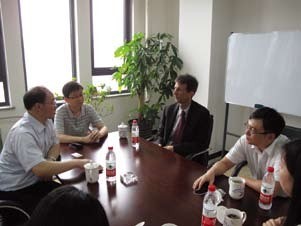
Dr. McGrath in a talk with Prof. ZHANG Suojiang (first left), head of the CoE for Green Technology on cooperation with TWAS and the developing world. Also present are Prof. LI Chunshan from the CoE, and Mr. WANG Zhenyu and Ms. FENG Kai from the CAS Bureau of International Cooperation.
The CoEs are to hold a series of workshops and training courses open to developing countries in the upcoming years, and through continued joint research projects they will make more contributions to the advancement of science in the developing world.
Dr. McGrath expressed his congratulations on the encouraging progress made by the host institutes in launching the Centers and emphasized the importance of enhanced and broadened scientific communications with developing countries through cooperative research and education.
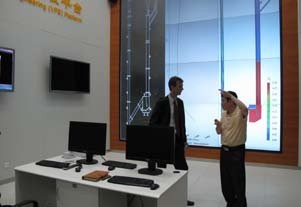
A researcher introduces to Dr. McGrath the Virtual Process Engineering (VPE) Platform at the CAS Institute of Process Sciences, the host of the CoE on Green Technology.
Dr. McGrath also discussed with the CoEs on future priorities and challenges in their development, and agreed on building a sustainable win-win partnership. He also offered to help coordinating the activities of the Centers via the network of TWAS, including helping the Centers to identify and nominate candidates for visiting scholars and for members of their Scientific Advisory Boards. Meanwhile the CoEs ensured that their programs would be guided by and relevant to the needs of developing countries, through working with TWAS Fellows from across the developing world.
Dr. McGrath was also led on lab tours to see the facilities on the campuses, including the Virtual Process Engineering Platform at the CoE for Green Technology, the Scientific Platform of Digital Earth at the CoE on Space Technology for Disaster Mitigation, and the Liquid Nitrogen Bio-store Room at the CoE for Biotechnology.
The new investment in the selected CoEs represents a new move made by CAS in implementing its internationalization strategy, with which it pledges to help training more S&T professionals, build branch research institutions, and enhance the role of CAS-TWAS CoEs in advancing science in the developing world. (BCAS)
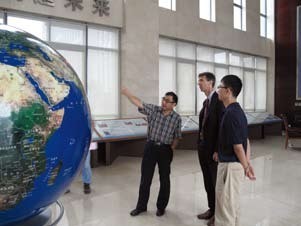
Prof. WANG Changlin, Director of the International Academic Division of the CAS Institute of Remote Sensing and Digital Earth (RADI), host institute of the CoE on Space Technology for Disaster Mitigation (STDM) greets Dr. McGrath at the entrance together with Prof. CHEN Fang, Deputy Director of STDM, and gives a brief introduction of RADI.
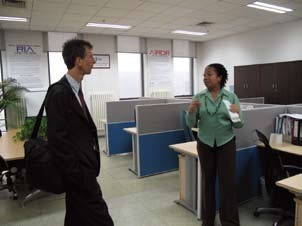
Dr. McGrath visits one of the international organizations hosted by RADI, the office of the Integrated Research on Disaster Risk (IRDR), a decade-long integrated research programme co-sponsored by the International Council for Science (ICSU), the International Social Science Council (ISSC) and the United Nations International Strategy for Disaster Reduction (UNISDR).
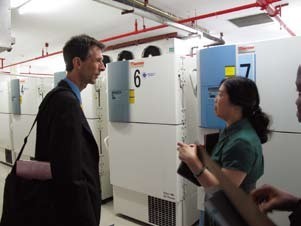
Prof. DONG Xiuzhu shows Dr. McGrath the facilities at the liquid Nitrogen bio-store room.
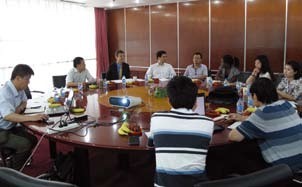
Dr. McGrath talks with the leading researchers from the Research Center for Eco-Environmental Sciences, the host institution of the CAS-TWAS Center of Excellence for Water and Environment. The two sides arrived at agreement on future priorities of the CoE and cooperation in promoting its activities.
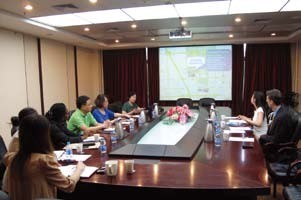
At the CAS Institute of Microbiology (IMCAS), Prof. Dong Xiuzhu, Deputy Director-General of IMCAS and Prof. LI Yin, Director of the CAS-TWAS CoE for Biotechnology respectively introduce the host institute.